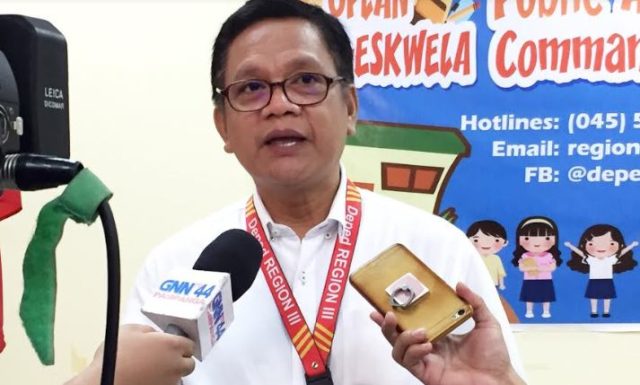(Department of Education OIC-Regional Director Nicolas Capulong (PIA Region 3 File Photo))
CITY OF SAN FERNANDO — The Department of Education (DepEd) will create a Regional Consultative and Advisory Body on Indigenous Peoples Education (IPED).
Its formation will be the highlight of a workshop to be attended by IP groups from November 12-15 in Angeles City.
“As stipulated in DepEd Order No. 32, series of 2015 or the Indigenous Peoples Education Curriculum Framework, our engagement with IP leaders and culture bearers is an essential aspect of curriculum contextualization,” DepEd OIC-Regional Director Nicolas Capulong said in a statement.
The three-day activity aims to sustain the dialogue and cooperation between DepEd and the IP communities through the Regional IPED Consultative and Advisory Body that is culturally sensitive and responsive to customary practices.
It will also be the venue where the roles and functions of the advisory body as stipulated in DepEd Order No. 34, series of 2017 or the Guidelines in the Formation of Consultative and Advisory Bodies on Indigenous Peoples Education in Regions Implementing the IPED Program will be discussed.
Lastly, the workshop will also be the venue for DepEd and IP leaders to formulate the IP cultural standards relative to the development of learning resources.
Participating cultural communities include Agta Casiguran and Ilongot from Aurora; Ayta Magbukon and Ayta Ambala from Bataan; Dumagét Bulos and Dumagét Kabulloan from Bulacan and Nueva Ecija; Kankana-ey from San Jose City; Ayta Mag-Indi and Ayta Mag-Antsi from Pampanga; Ayta Abellen and Ayta Mag-Antsi from Tarlac; Ayta Botolan from Zambales; and Ayta Ambala from Olongapo City.
Initiated in 2013, the IPEd Program has strengthened the enabling conditions for culture-based education while promoting the value of indigenous identity, knowledge, competencies and other aspects of their cultural heritage.
The program’s initiatives include establishment of dialogue mechanisms with IP communities, personnel hiring and capacity development and responding to access concerns. – PIA 3





